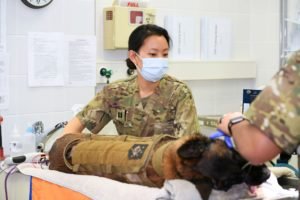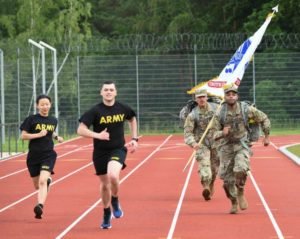By Michelle Thum
Public Health Command Europe

When Capt. Peony Kim joined the military four years ago, she did not realize the multiple roles a veterinarian in the U.S. Army has to fill.
“I actually didn’t seriously consider Veterinary Medicine until after graduating from college,” said Capt. Peony Kim, officer in charge of the veterinary treatment facility in Stuttgart. “I had a rather narrow view of veterinary medicine at the time.”
Kim’s older brother joined the Navy in 1999 and inspired her to explore the opportunities a career in the military offers.
“When I saw how vast the field of veterinary medicine in the U.S. Army was, from clinical medicine to research to Public Health, I knew I could never be bored,” explained Kim. “The opportunities for learning and growth seemed endless.”
Kim was born and raised in Claremont, California, commissioned as a second Lieutenant in student status in 2013 and joined active duty in 2016.
“It was a call to be a part of a bigger mission, to see more of the world, and to take on new challenges,” said Kim. “It is also a tremendous honor to serve and support our canine Soldiers, the military working dogs.”
In comparison to being a veterinarian on the economy, the U.S. Army offered Kim opportunities she had not initially considered.
“From learning basic weapons maintenance to how to lead a team of Soldiers and civilians, the Army has definitely kept me on my toes,” explained Kim. “I’m thankful for the Soldiers and leaders who continue to challenge me and keep me accountable.”
A workday as the officer in charge of the Stuttgart Veterinary Treatment Facility is never the same, according to Kim. One day she might be treating privately owned animals or taking care of an injured military working dog, and another day she may be auditing a bottled water facility in Poland.

Being a veterinarian, managing a veterinary clinic, overseeing the food safety mission and leading a team of Soldiers are only a few of the many hats a Veterinary Corps officer wears.
“There is no way I can manage all of this in a regular work week. I rely heavily on my amazing team of Soldiers and civilians to support the garrison mission on a day-to-day basis, both the animal care team and the food inspection team.” said Kim.
According to Kim, the Food Safety and Defense mission is probably least talked about when it comes to Veterinary Services, but it has the greatest scope.
“Napoleon once said, ‘An army marches on its stomach,’ Kim said. “Everyone has to eat! Foodborne illnesses are debilitating and also have the potential to be widespread – a bad combination for the fighting force.”
From commissary goods on garrison to meals ready to eat in the field, veterinary food inspectors work to ensure that the food supply is safe. Kim has conducted several sanitary food inspection audits across Poland, Morocco, Bulgaria and Romania during the short period of time she has been stationed in Germany.
The recent outbreak of COVID-19 posed an additional and unexpected opportunity to further diversify her skillset.
Kim was recently tasked to inspect five barber shops across the garrison to ensure that preventive sanitation measures were in place for a safe reopening for service members and their families.
“Stuttgart doesn’t have its own preventive medicine team, so usually personnel come from Bavaria to help with sanitary inspections of wellness facilities,” said Kim. “Due to the COVID-19 restrictions, this posed a challenge.”
Kim adapted quickly and was able to use her expertise and knowledge from previous audits to step in and help the preventive medicine team determine whether facilities would be safe to open barber shops again.
“The primary purpose of the public health inspections was to ensure that on-post barber shops and beauty salons met the same Germany-mandated COVID-19 mitigation standards needed in order to facilitate the safety of both staff and patrons.” said Capt. Charles Pham, Chief of Environmental Health Sciences at the U.S. Army Medical Department Activity Bavaria.
Based on Kim’s notes and findings, Pham was able to assess if the facilities met the necessary safety guidelines to welcome clients again.
“Army veterinarians are dual professionals: they are both healthcare providers for animals and public health professionals tasked with the assurance of the Army food supply chains,” explained Pham. “The rapid but safe reopening of routine services is beneficial to the morale of service members and their families by providing a sense of normality during the COVID-19 pandemic.”
Pham appreciated Kim’s willingness to use her public health expertise while conducting the barber shop and beauty salon inspections.
“Preventive Medicine and Veterinary Services work closely together under the umbrella of Public Health. I’m glad I was able to assist my sister team in this way,” said Kim who is looking forward to participating in more joint inspections during her Army career.
